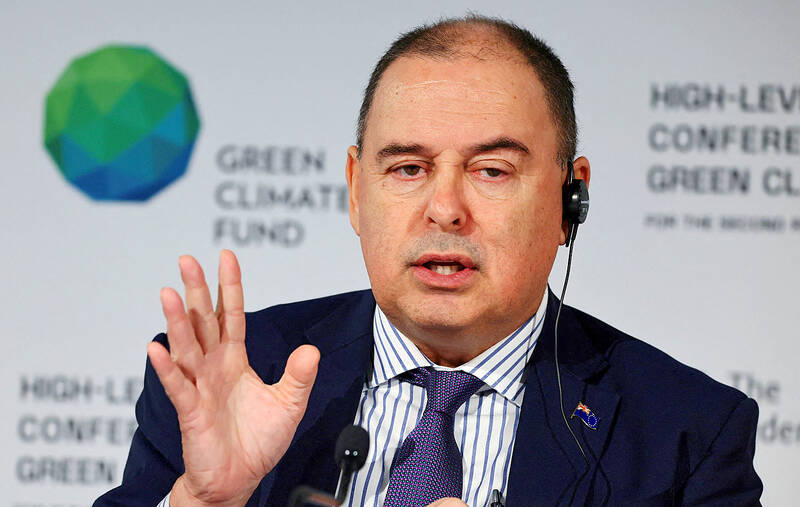A strategic partnership deal between China and the Cook Islands spans areas from deep-sea mining to education scholarships, but excludes security ties, a document released by the Pacific nation’s government showed.
Western nations that traditionally held sway in the region have become increasingly concerned about China’s plans to increase influence after Beijing signed defense, trade and financial deals with Pacific countries in the past three years.
Amid domestic criticism of lack of transparency, the government unveiled the action plan for the deal on Monday in the Cook Islands, in response to calls from New Zealand, which had not been consulted, despite constitutional ties.

Photo: Reuters
“This does not replace our longstanding relationships with New Zealand, Australia and others, but rather complements them, ensuring that we have a diversified portfolio of partnerships,” Cook Islands Prime Minister Mark Brown told parliament.
“We are strengthening economic diplomacy through initiatives like our comprehensive strategic partnership with China,” he added, pointing to opportunities on offer in areas such as trade, infrastructure and ocean resources.
Opposition has grown in the Cook Islands to any threat its pacts with China pose to close ties with New Zealand, and Brown’s government faces a no-confidence vote in parliament after Tuesday next week called by opposition parties.
Brown’s remarks, which also expressed confidence in Cook Islands’ ability to protect its interests, followed a protest march to parliament in the capital of Avarua backing ties with New Zealand.
“Stay connected with New Zealand,” read one placard held by protesters, who also brandished huge replicas of New Zealand passports.
“The first concern is the lack of consultation not only with us Cook Islanders, but also with New Zealand,” said opposition leader Tina Browne, who had pushed for transparency on the deal.
China is to give a one-time grant of about US$4 million to the nation of 15,000, Brown told reporters after his return home from Beijing.
New Zealand raised concerns about his visit to China, as it had not seen in advance the agreements signed, despite having asked to review them.
A spokesman for New Zealand’s deputy prime minister said he looked forward to the release of all the pacts signed on the trip.
The neighboring government would need to analyze the contents of the pact released on Monday and its implications for New Zealand and the people of Cook Islands, whose government it intends to engage with in the coming days, he added.
Situated halfway between Hawaii and New Zealand, the self-governing Cook Islands can interact with the international community as an independent state.
The neighbors have committed to consulting on security, defense and foreign relations. New Zealand also provides some budget support and commits to defend the people, who are its citizens.
Seabed mining, hydrography, disaster relief and cultural ties are areas the pact earmarks for cooperation.It does not explicitly mention security, but the prospect of greater maritime cooperation could fuel concern over potential military use of information and marine infrastructure.
While New Zealand has previously quashed the Cook Islands’ aspirations of joining the UN without becoming independent, Monday’s action plan says China would back its hopes to widen membership of global bodies.

Incumbent Ecuadoran President Daniel Noboa on Sunday claimed a runaway victory in the nation’s presidential election, after voters endorsed the young leader’s “iron fist” approach to rampant cartel violence. With more than 90 percent of the votes counted, the National Election Council said Noboa had an unassailable 12-point lead over his leftist rival Luisa Gonzalez. Official results showed Noboa with 56 percent of the vote, against Gonzalez’s 44 percent — a far bigger winning margin than expected after a virtual tie in the first round. Speaking to jubilant supporters in his hometown of Olon, the 37-year-old president claimed a “historic victory.” “A huge hug

Two Belgian teenagers on Tuesday were charged with wildlife piracy after they were found with thousands of ants packed in test tubes in what Kenyan authorities said was part of a trend in trafficking smaller and lesser-known species. Lornoy David and Seppe Lodewijckx, two 19-year-olds who were arrested on April 5 with 5,000 ants at a guest house, appeared distraught during their appearance before a magistrate in Nairobi and were comforted in the courtroom by relatives. They told the magistrate that they were collecting the ants for fun and did not know that it was illegal. In a separate criminal case, Kenyan Dennis

A judge in Bangladesh issued an arrest warrant for the British member of parliament and former British economic secretary to the treasury Tulip Siddiq, who is a niece of former Bangladeshi prime minister Sheikh Hasina, who was ousted in August last year in a mass uprising that ended her 15-year rule. The Bangladeshi Anti-Corruption Commission has been investigating allegations against Siddiq that she and her family members, including Hasina, illegally received land in a state-owned township project near Dhaka, the capital. Senior Special Judge of Dhaka Metropolitan Zakir Hossain passed the order on Sunday, after considering charges in three separate cases filed

APPORTIONING BLAME: The US president said that there were ‘millions of people dead because of three people’ — Vladimir Putin, Joe Biden and Volodymyr Zelenskiy US President Donald Trump on Monday resumed his attempts to blame Ukrainian President Volodymyr Zelenskiy for Russia’s invasion, falsely accusing him of responsibility for “millions” of deaths. Trump — who had a blazing public row in the Oval Office with Zelenskiy six weeks ago — said the Ukranian shared the blame with Russian President Vladimir Putin, who ordered the February 2022 invasion, and then-US president Joe Biden. Trump told reporters that there were “millions of people dead because of three people.” “Let’s say Putin No. 1, but let’s say Biden, who had no idea what the hell he was doing, No. 2, and